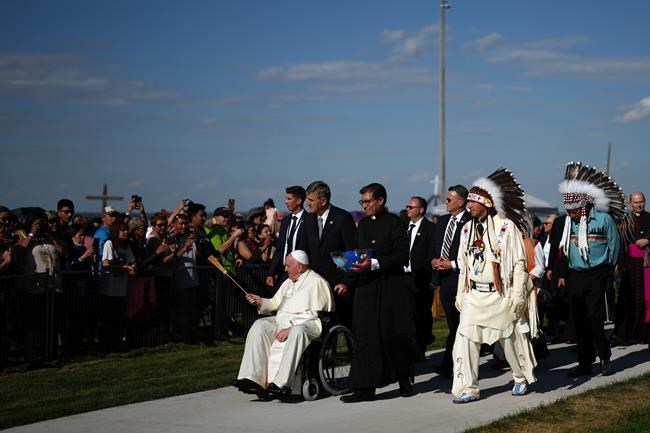LAC STE. ANNE, Alta. — Pope Francis spoke in three First Nations languages at a sacred pilgrimage site hours after his public mass in Edmonton was called a missed opportunity for not including Indigenous culture or traditions.
On Tuesday, Francis joined hundreds of people at Lac Ste. Anne, northwest of Edmonton, and during a church service, wearing a red Metis sash around his neck, said hello in Nakota, Cree and Blackfoot.
"Aba-wash-did! Tansi! Oki!"
Many cheered.
The site has been important to Indigenous people and Catholics for generations. Francis blessed the lake, smiling broadly, and used a traditional wooden tool with a brush on the end to flick some of the water at outstretched hands in the crowd.
The Pope's liturgy included thoughts on the Roman Catholic Church's past and future relationship with Indigenous Peoples, as well as the important role of Indigenous women in their communities.
"Dear Indigenous brothers and sisters, I have come here as a pilgrim also to say to you how precious you are to me and to the church," Francis said.
"I want the church to be intertwined with you, as tightly woven as the threads of the coloured bands that many of you wear."
It was a stark contrast from the earlier mass in front of thousands at Edmonton's Commonwealth Stadium. There, Francis did not address Indigenous Peoples, cultures or traditions much during the event, despite having delivered an apology a day earlier for abuses at Catholic-run residential schools.
"I just don't know what they were thinking," Daryold Corbiere Winkler, a priest in Ottawa who is Anishinaabe, said about the Edmonton service.
"For me, this is a missed opportunity for a mass to celebrate Indigenous traditions and cultural practices. They just didn't. They did the opposite."
Corbiere Winkler said he was optimistic when the mass started with Indigenous drumming and the popemobile drove Francis around the stadium's football field. The Pope blessed and kissed babies and young children who were handed to him and cheers echoed from the stands filled with thousands of people.
Winkler said his hopes were dashed as the service took a traditional turn. He was devastated when the eucharistic prayer was delivered in Latin, considering residential school survivors were there.
"That's the language they would have heard in residential school," he said. "A lot of survivors, that's the mass they heard when they were children."
Angel Dermit said the rigid mass reminded her of church ceremonies from when she was a child at the Lower Post Residential School in British Columbia.
“When I heard the service, it’s a lot different than how I believe in God and how I believe in Jesus," she said.
The Pope focused his homily, the comments following Scripture readings, on the importance of grandparents and the elderly.
Near the end, he prayed for "a future in which the history of violence and marginalization suffered by our Indigenous brothers and sisters is never repeated."
About 65,000 free tickets were available for the mass but many rows of seats were empty, particularly in the upper decks. Organizers estimated there were about 50,000 in attendance. Hats and clothing commemorating the papal visit were sold near an entrance for between $10 and $45.
During the blessing of the eucharist, a person yelled "repeal the doctrine of discovery" — papal documents used in colonization.
Rose-Marie Blair-Isberg, who is a residential school survivor from White River First Nation in Yukon, said it felt like the church was "selling their point of view" during the mass.
Edith Didzena held a photo of her mother, Regina Etthidzine, as she sat in the stadium with her children. Didzena, who lives in Bushe River on the Dene Tha' First Nation in Alberta, said her mother went to residential school but died before she could hear the Pope's apology.
On Monday, during a visit to the community of Maskwacis, south of Edmonton, the Pope apologized to residential school survivors and their families for the role members of the church played in the cultural destruction and forced assimilation of Indigenous Peoples.
Patty Crofton, a member of Sagkeeng First Nation in Manitoba, said she did not sleep well after hearing the apology because it brought back difficult memories. She went to day school and her parents went to residential schools.
“I am on my own healing journey from all of this," she said before the mass.
Eila Harper from St. Theresa Point First Nation in Manitoba said she is Catholic and attends mass every Sunday. She arrived at Lac Ste. Anne about five hours early and had a front-row seat to see Francis bless the lake.
“I was kind of emotional seeing him and thinking of our religion and everything back home,” she said.
“Since he is blessing the water, everybody will be healing."
Francis is to travel to Quebec City on Wednesday and end his visit in Iqaluit on Friday.
The Indian Residential Schools Resolution Health Support Program has a hotline to help residential school survivors and their relatives suffering trauma invoked by the recall of past abuse. The number is 1-866-925-4419.
This report by The Canadian Press was first published July 26, 2022.
— With files from Daniela Germano in Edmonton and Kelly Geraldine Malone in Winnipeg
Brittany Hobson and Bob Weber, The Canadian Press



